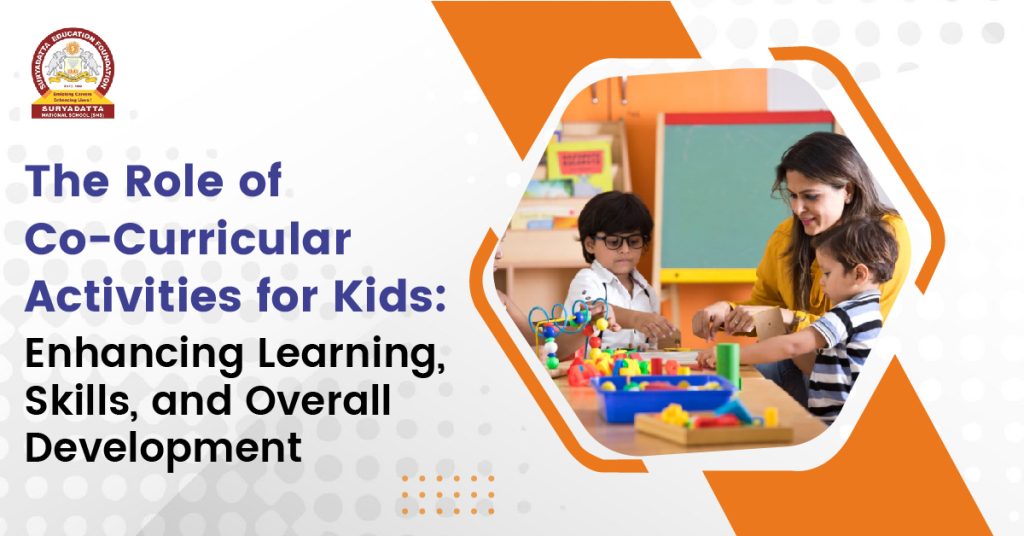What are the National Education Policy (NEP) 2020 guidelines for Foundational years? (# years to 7 years)
The National Education Policy (NEP) 2020 has redefined the educational framework in India with its progressive and inclusive approach. One of the most transformative aspects of NEP 2020 is its focus on foundational years, emphasizing early childhood education for children aged 3 to 7 years. If you’re a parent in Bavdhan, Pune, Maharashtra, seeking the best school for your child’s foundational years, this guide will help you understand the NEP 2020 guidelines and how Suryadatta National School (SNS) aligns with these reforms. What are the Foundational Years? The foundational years cover the critical age group of 3 to 7 years, during which a child undergoes rapid cognitive, emotional, and physical development. NEP 2020 has introduced a restructured 5+3+3+4 schooling system, where the first five years fall under the Foundational Stage: 3 years of pre-primary education (Nursery, LKG, and UKG). 2 years of primary education (Grades 1 and 2). This stage focuses on play-based, activity-driven, and experiential learning to develop essential skills in young learners. NEP 2020 Guidelines for Foundational Years 1. Holistic and Multidisciplinary Learning The curriculum is designed to develop language, literacy, numeracy, and socio-emotional skills. Equal importance is given to arts, music, physical activities, and storytelling, making learning fun and engaging. 2. Play-Based and Experiential Education Emphasis on play-based learning to stimulate creativity and curiosity. Activities such as puzzles, role play, and outdoor exploration help in problem-solving and critical thinking. 3. Focus on Early Language and Numeracy Skills Strong foundation in mother tongue/regional language to ensure effective learning. Development of basic numeracy skills to prepare children for future academic success. 4. Inclusive Education The policy ensures equal opportunities for all children, including those from underprivileged backgrounds or with special needs. 5. Integration of Technology Technology-enabled learning tools are introduced to provide interactive and immersive experiences, ensuring children adapt to the digital age. 6. Teacher Training and Support Teachers undergo rigorous training to ensure effective delivery of the NEP guidelines, focusing on child-centric and activity-based teaching methods. Why Are the Foundational Years Crucial? Research shows that 90% of a child’s brain development occurs by the age of 6. The right guidance and learning environment during these years shape their cognitive abilities, social skills, and overall personality. By implementing NEP 2020, schools like Suryadatta National School (SNS) ensure that your child gets the best start in life. How Suryadatta National School (SNS) Implements NEP 2020 for Foundational Years Located in the heart of Bavdhan, Pune, Suryadatta National School (SNS) is a CBSE-affiliated institution that has been a pioneer in delivering quality education. Here’s how SNS aligns with NEP 2020: 1. Innovative Curriculum SNS offers a meticulously designed curriculum that integrates play, exploration, and experiential learning to foster creativity and critical thinking. 2. World-Class Infrastructure The school provides a safe, stimulating, and modern environment equipped with smart classrooms, activity zones, and outdoor learning spaces. 3. Qualified Educators SNS boasts a team of highly trained teachers skilled in implementing child-centric and activity-driven teaching methodologies. 4. Holistic Development From music and dance to sports and yoga, SNS focuses on nurturing physical, emotional, and cognitive growth. 5. Ranked Among Top Schools Ranked 1st in Academic Excellence by Pune Times Mirror (2021). Awarded Best CBSE School in Maharashtra by Eminent Research Brand IQ. Why Choose Suryadatta National School for Your Child’s Foundational Years? If you’re looking for a school in Bavdhan, Pune, that adopts NEP 2020 guidelines and ensures holistic development, Suryadatta National School is the ideal choice. Here’s why: Student-Centric Approach: Tailored to individual learning needs. Focus on Life Skills: Preparing children for a dynamic future. Proven Track Record: Recognized for academic excellence and innovative teaching methods. Take the First Step Toward Your Child’s Bright Future! The foundational years are pivotal in setting the tone for lifelong learning. Give your child the best start by enrolling at Suryadatta National School (SNS) in Bavdhan, Pune. Visit Suryadatta National School today to learn more about their programs and facilities. Admissions are open now!



